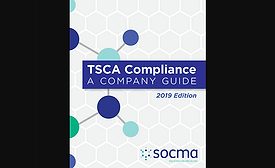Home » regulation/legislation
Articles Tagged with ''regulation/legislation''
The focus of the Pharma Working Group will be to prepare the pharmaceutical industry for the Drug Supply Chain Security Act, which will go into effect in 2023.
Read More
FEICA Summary Report Addresses Risk of Cyclic Esters in Polyester Adhesives
The report is intended to outline the main findings of the risk assessment and explain that human exposure to cyclic esters from polyester pre-polymers in food packaging adhesives is not relevant from a toxicological point of view.
July 3, 2020
EPA Finalizes Amendments to Miscellaneous Organic Chemical Manufacturing National Emission Standards for Hazardous Air Pollutants
The amendments are expected to reduce emissions of hazardous air pollutants from the source category by 107 tons per year, which includes reductions in ethylene oxide emission of approximately 0.76 tons per year.
June 15, 2020
EPA Proposes Rule to Improve Guidance Transparency
The EPA reports that this new rule will increase the transparency of the agency’s practices around guidance and will improve its process for managing guidance documents.
May 27, 2020
Strategic Solutions
Formulation and Availability of Building and Construction Adhesives, Sealants, and Other Materials
Engineers, architects, specifiers, facility managers, and homeowners must spend time analyzing what performance levels can be obtained by the adhesive and sealant products that are available to them for the environments in which they are being used.
May 15, 2020
Advancing Adhesives
Legislation on GLYMO Will Shape Packaging in 2020
Epoxy silanes like GLYMO and GLYEO are adhesion promoters used in food packaging, but safety issues have prompted the development of new alternatives.
April 21, 2020
EPA Announces Plan to Reduce TSCA Fees for Stakeholders
The EPA plans to initiate a new rulemaking process to consider proposing exemptions to the current TSCA Fees Rule’s self-identification requirements associated with EPA-initiated risk evaluations for certain manufacturers.
April 6, 2020
EPA Announces Final Rule to Modernize TSCA Reporting
The EPA is extending the reporting period for CDR data submitters from September 30 to November 30 in order to provide additional time for the regulated community to familiarize themselves with these revisions.
March 25, 2020
Resolving Chemical Incidents Quickly and Safely
The impacts of chemical-related incidents can be mitigated by following the latest European Chemical Industry Council guidelines for level-1 emergency response.
November 21, 2019
SOCIETY OF CHEMICAL MANUFACTURERS & AFFILIATES (SOCMA): TSCA Compliance Handbook
The handbook reportedly serves as a guide for not only regulatory implementation, but also internal reviews and audit preparation.
July 18, 2019
Keep the info flowing with our eNewsletters!
Get the latest industry updates tailored your way.
JOIN TODAY!Copyright ©2025. All Rights Reserved BNP Media.
Design, CMS, Hosting & Web Development :: ePublishing









